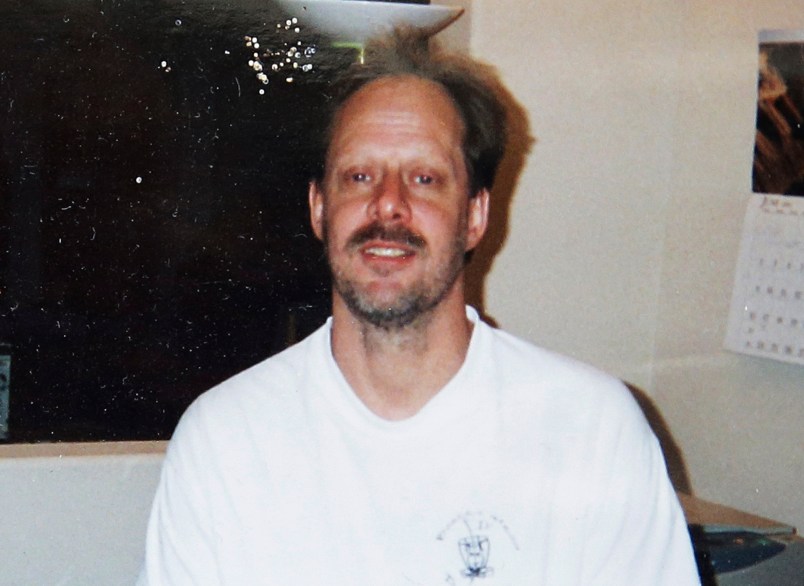(AP) — When Stephen Craig Paddock — a white American — was identified as the gunman who rained bullets on multitudes at a Las Vegas concert, he was quickly characterized as a “lone wolf.”
Had he been of another race or ethnicity, would he have been branded a terrorist, instead — or would aspersions have been cast on his minority group?
The question has been raised again and again in recent days, as critics suggested that the conversation around our nation’s tragedies is often framed in divisive, racial code words. If whites are blamed, they say, it is as individuals; for minorities, it is suggested that their crimes are part of a larger narrative.
“For whites, it’s ‘just something that happened,'” said Texas Southern University professor Sharlette Kellum-Gilbert. “When it’s of another race, ‘this is how they are,’ and there are calls for law and order.”
Shaun King raised the same point Tuesday in a column for The Intercept entitled “The White Privilege of the ‘Lone Wolf’ Shooter.”
“White men who resort to mass violence are consistently characterized primarily as isolated ‘lone wolves’ — in no way connected to one another,” King wrote. “For centuries, when an act of violence has been committed by an African-American, racist tropes follow — and eventually, the criminalization and dehumanization of an entire ethnic group.”
Last year, when Micah Xavier Johnson shot at police officers in Dallas, Texas, killing five and injuring nine others, Black Lives Matter was blamed — though he had no known link to the movement.
In 2014, when Alton Nolen was arrested in the decapitation of one co-worker and the stabbing of another, some were quick to blame Alton Nolen’s “radicalization” as a recent convert to Islam. They could have categorized the crime instead as workplace violence — Nolen was embittered by his suspension from his work at a Oklahoma food processing plant.
The lone wolf label has been frequently ascribed to mass killers, like Aurora, Colorado, movie theater shooter James Holmes, a white man who killed 12 people in 2012. The term is a convenient one for a society eager to ease its anxiety after such a horrific event, said Mark Hamm, a professor of criminology at Indiana State University and author of “Age of Lone Wolf Terrorism.”
“It’s easy to leap to that metaphor,” Hamm said. “Terrorism is such a loaded term. There is an ethnic piece to that.”
Whether federal authorities or leaders decline to define these acts, the public’s definition is a broader one, Hamm said.
“What if the classification is wrong?” he said. “Then all you have done is maybe assuaged people’s anxiety for the moment.”
Authorities have not yet determined a motive in the Las Vegas shootings, the deadliest in modern U.S. history, which left 59 people dead and more than 500 injured after a country music festival on Sunday.
President Donald Trump condemned the shootings Monday as “an act of pure evil,” but stopped short of declaring the incident domestic terrorism. On Tuesday, Trump referred to Paddock as “sick” and “demented” — suggesting that mental health problems were a possible explanation for the tragedy.
Trump and his administration have been criticized as using racially tinged language. Last year, amid the investigation into the Pulse nightclub shooting in Orlando, Fla., Trump criticized former President Barack Obama for not immediately referring to shooter Omar Mateen’s acts as “radical Islamic terrorism.” Though Mateen professed support for the Islamic State group, his specific motives — and the contribution of any personality disorder he might have had — have never been determined.
Obama was unsparing in describing the killings of nine worshippers in a black church in Charleston, South Carolina, in 2015 by Dylann Roof as “an act of terror” and “an act of hate.”
Trump was criticized in August for declining to more strongly condemn white supremacists in Charlottesville, Virginia, after a protest against the removal of a statue of Confederate Gen. Robert E. Lee turned violent and a driver fatally struck an anti-protester. Instead, the president said “many sides” were responsible.
Wes Bellamy, vice-mayor of Charlottesville, said the tone has been undoubtedly different on Las Vegas. The solution for the double standard, he said, is more honesty.
“What transpired in Las Vegas and what happened in Charlottesville was domestic terrorism,” said Bellamy. “It has no color. We have to address it and call it what it is, no matter who does it.”



